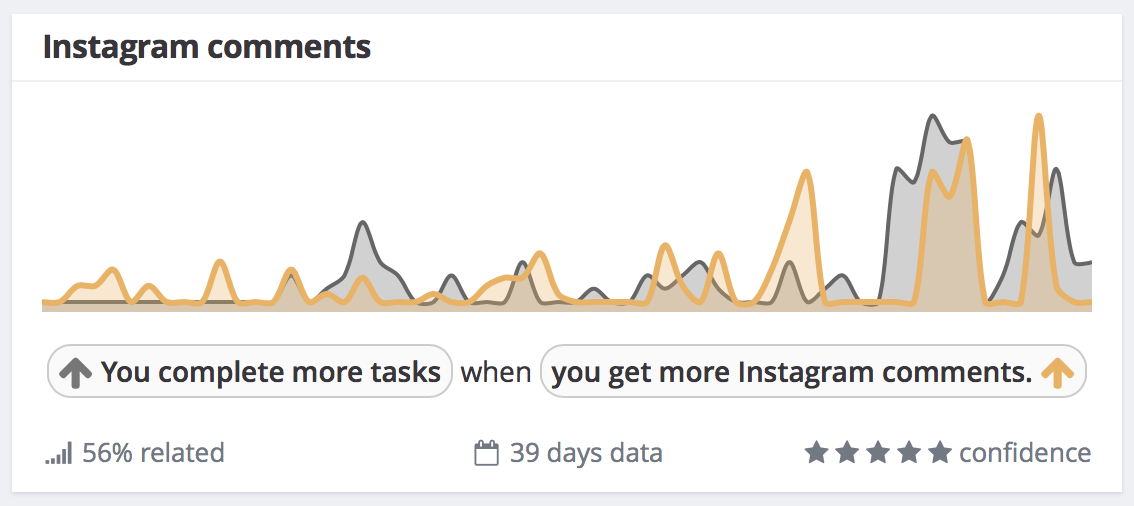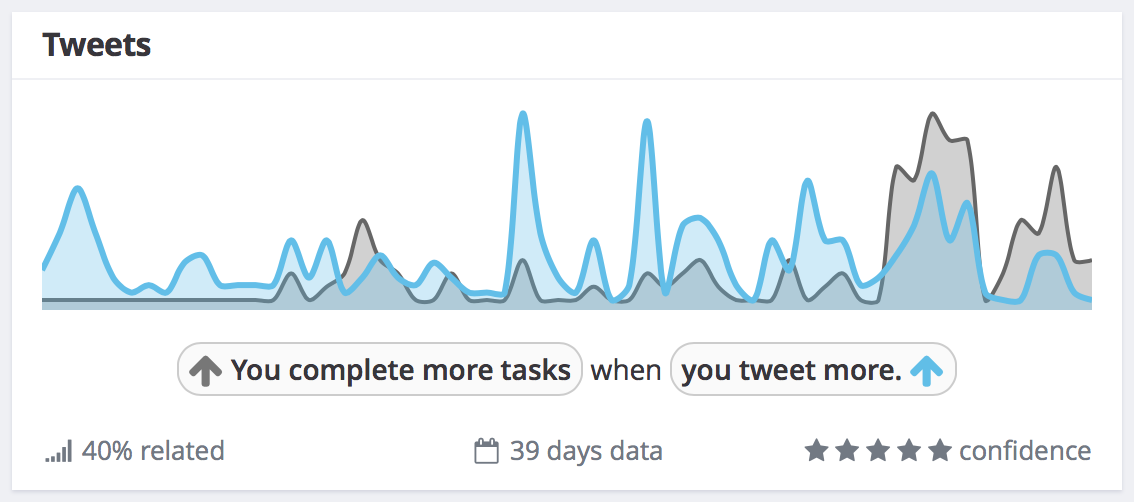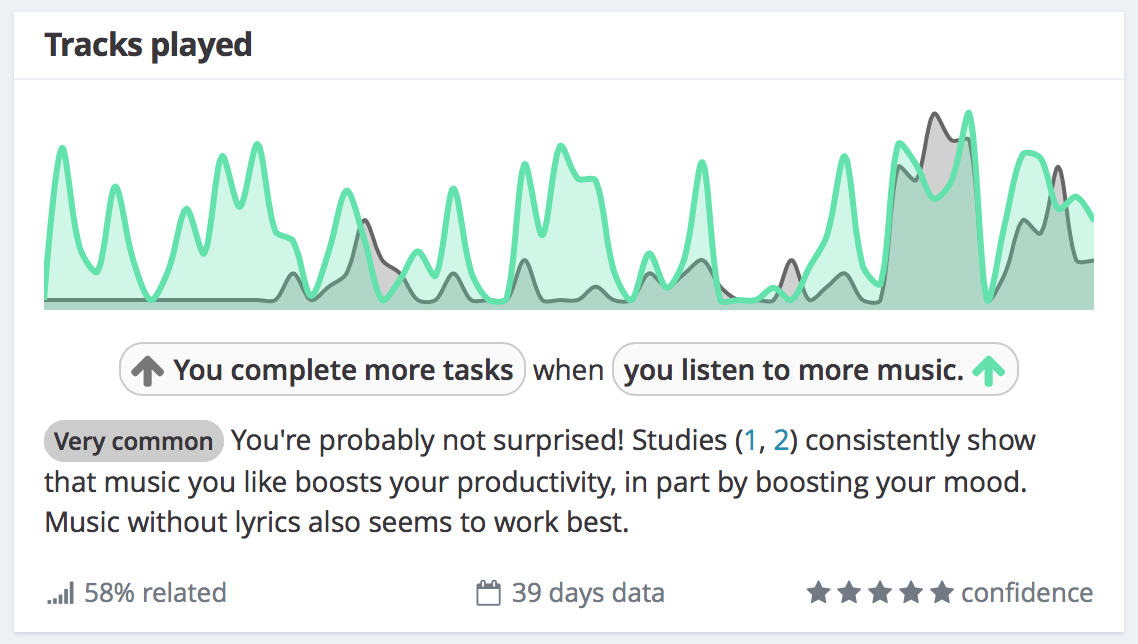31 Aug 2016
By Belle
Finding insights in your Todoist data with Exist
We’ve been adding new integrations to Exist recently, and there’s one we’re particularly excited about: Todoist. Along with our previous productivity integrations, GitHub and RescueTime, you can now get an even clearer picture of what affects your productivity through Exist.
I’ve been finding fascinating insights in my own productivity data with Exist, so I thought it might be useful to share what I’ve found so you can see how Todoist works with Exist.

I use pen and paper a lot for planning my days, but I try to keep all my work-related tasks in Todoist so I can track them with Exist. Here are some of the most interesting correlations in my Todoist data so far:
Keep in mind, our Todoist integration is very recent, so there’s only about a month of data to work with. In time, the correlations will get stronger and new ones will emerge, as Exist has more data to work with.
Also, an obligatory reminder: correlation does not mean causation. Just because there is some correlation between two sets of data doesn’t necessarily mean that one has a direct effect on the other. Exist uncovers these correlations, but leaves it to the user to figure out if they’re related or not, and how.

I complete more tasks when I get more comments and likes on Instagram. I guess my productivity is in the hands of the masses! Actually, I also completed more tasks when I post more on Instagram, which correlates with getting more likes and comments. I use Instagram as a little escape when I need a break from work, but I also tend to post photos relating to analogue productivity, so the more work I get done, the more I have to take photos of!
I complete more tasks when I have a better day. A “better day” in Exist refers to how highly I rated my mood at the end of the day out of 5. I know I feel a lot better about my day when I get a lot done. I saw that happen this week: I rated Wednesday highly because I felt like I got through a huge amount of work, and otherwise it was a good day. But on Thursday I felt stressed about my to do list, and it seemed to grow faster than I could get things done. Thursday’s mood ended up being rated lower than Wednesday.
Then again, I find it harder to have a productive day when I don’t feel good in the first place. If I’m really tired, or stressed, or just feeling down, it can be hard to focus or find the motivation to work. So I may need to be in a good mood before working in order to get a lot done, which reinforces my good mood—perhaps it’s all cyclical.

I complete more tasks when I tweet more. This one’s pretty easy. I tend to find things to tweet about (and make the effort of tweeting) more often when I’m at my computer—which also happens to be when I’m more likely to complete tasks.

I complete more tasks when I listen to more music. Another easy one. When I need to get in the zone and power through my to do list, I pop my headphones on. I guess it must work, if I actually do get those tasks completed!
I complete more tasks on Mondays. I didn’t expect this one! Not only are Mondays tough for most of us, it’s my grocery day, so there’s always a chunk of time before lunch when I’m planning meals for the week and heading out to do shopping.
There could be two explanations for this correlation: I like to get through my freelance work early in the week so I can focus on Exist and Larder work without worrying about deadlines. If that plan is working, perhaps I’m getting through a lot of work on Mondays as I get stuck into my freelance work.
On the other hand, since Mondays can be a slog, maybe I’m finding small tasks to get through on Mondays so I feel productive without doing anything too hard. I’ll have to watch this correlation and see if it grows stronger once I have more data in Exist.
I complete more tasks when I go to bed earlier the night before. When I go to bed earlier, I don’t just get more sleep; I tend to get better quality sleep. Going to bed earlier generally means I’m already tired, so I’ll fall asleep quickly, and I’m not spending hours looking at my phone and waking up my brain—I do that more when it’s late and I’m struggling to fall asleep (which only makes the situation worse, of course).
So going to bed earlier tends to mean I’m more refreshed, and I’ve had a less broken sleep (which also correlates with a worse day for me, and lower productive time logged).
I complete more tasks when I spend less time working out. Now this one is a bummer. I had already guessed it was true, but I can’t argue with the data. It’s hard to justify making time for working out when it means I get less done. But I want to work out more often, because I know it’s good for me.
I’m not sure what I’ll do about this one. I could try working out for a shorter period, or shortening the extra time used up to get ready to work out, cool down, shower, and get changed. I’m sure all that extra time contributes to me not getting as much done, so maybe if I’m quicker to get out the door, and get showered and changed afterwards, I’ll get more done.
This is another one to keep an eye on as I add more data.
If you don’t already have an account, sign up for our 30-day free trial to see what Exist can tell you about your Todoist data.
Subscribe Keep up to date with the Exist blog. Delivered to your inbox.